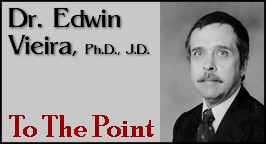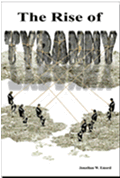THOUGHT
MUST PRECEDE ACTION
PART 2 of 3
By
Dr. Edwin Vieira, Jr.,
Ph.D., J.D.
June 23, 2013
NewsWithViews.com
In any event, even if Mr. Williams is not completely wrong to assert that “Obama can only be removed from office via impeachment”, it would still be advisable to inquire as to whether any other remedy may be available.
4. Criminal prosecution would appear to be the obvious first choice. For example, Title 18, United States Code, Section 912 provides that “[w]hoever falsely assumes or pretends to be an officer * * * acting under the authority of the United States * * * , and acts as such, or in such pretended character demands or obtains any money, paper, document, or thing of value, shall be fined * * * or imprisoned not more than three years, or both”. Mr. Williams, however, asserts that “before any occupant of the Oval Office can be charged with or prosecuted for crimes, they [sic] must first be removed from office via impeachment, so that the business of the people can continue while the individual is being prosecuted for criminal activities”. In support of this contention, he cites a memorandum prepared by lawyers in the Department of Justice, of all people! As an outspoken critic of the General Government—and rightly so—Mr. Williams should have been more discerning. For the Constitution makes it plain as day that no such requirement exists.
The only provision in the Constitution for any immunity with respect to violations of criminal law for any public official while that official remains in office appears in Article I, Section 6, Clause 1: “The Senators and Representatives [in Congress] * * * shall in all Cases, except Treason, Felony and Breach of the Peace, be privileged from Arrest during their Attendance at the Session of their respective Houses, and in going to and returning from the same”. So, Members of Congress may be subjected to “Arrest”—and presumably thereafter tried, convicted, and imprisoned or otherwise punished—on charges of “Treason, Felony and Breach of the Peace”, even “during their Attendance at the Session of their respective Houses”, and even while they are on the very floor of the House or of the Senate, engaged in their official business. Inasmuch as the category “Felony” includes a multitude of crimes, and inasmuch as it is not inconceivable (particularly today) that every Member of Congress might be implicated in some “Felony” or other at the same time, therefore the Constitution allows for the “Arrest” of any Member, and even the entire Membership, of Congress—with no concern whatsoever (in Mr. Williams’ words) that “the business of the people can continue while the[se] individual[s are] being prosecuted for criminal activities”. And this notwithstanding that the Constitution in Article I, Section 5, Clause 2 provides a means equivalent to impeachment, conviction, and removal from office which is applicable to Members of Congress: to wit, that “[e]ach House may * * * , with the Concurrence of two thirds, expel a Member”. Thus, a Member of Congress whose criminal misbehavior comes to light may first be expelled and then subjected to “Arrest”. But he also may first be subjected to “Arrest”, and only thereafter expelled.
In Article II and Article III, the Constitution extends to the President and to the Judiciary not even the limited immunity it grants to Members of Congress, that “[t]hey shall in all Cases, except Treason, Felony and Breach of the Peace, be privileged from Arrest”. So, on the strength of this silence and the legal principle inclusio unius exclusio alterius, no immunity from “Arrest” (and thereafter from subsequent indictment, prosecution, trial, conviction, and punishment) for any sort of criminal misbehavior exists for a rogue President or any rogue judge.
Inasmuch as Article VI, Clause 3 of the Constitution requires that “[t]he Senators and Representatives [in Congress] * * * , and all executive and judicial Officers * * * of the United States * * * , shall be bound by Oath or Affirmation, to support this Constitution”, and inasmuch as the Constitution creates only a limited immunity from “Arrest” for Members of Congress and no immunity whatsoever for the President or for any judge, therefore Congress can enact no statute, the President can promulgate no policy (through executive orders or otherwise), and the Judiciary can hand down no opinion that creates, enforces, rules in favor of, recognizes, or otherwise treats as even arguably legitimate any more extensive immunity.
Article I, Section 3, Clause 7 of the Constitution does provide that “[j]udgment in Cases of Impeachment shall not extend further than to removal from Office, and disqualification to hold and enjoy any Office of honor, Trust or Profit under the United States; but the Party convicted shall nevertheless be liable and subject to Indictment, Trial, Judgment and Punishment, according to Law”. This, however, is not because “Indictment, Trial, Judgment and Punishment” of some rogue “Officer” of the United States must only follow his “Impeachment”. The Constitution confines the allowable penalties for “Impeachment” “to removal from Office, and disqualification to hold and enjoy any Office of honor, Trust or Profit under the United States” in order to preclude Congress from legislating additional punishments, as had theretofore been allowed in “the method of parliamentary impeachment: wherein such penalties, short of death, are inflicted as to the wisdom of the house of peers shall seem proper; consisting usually of banishment, imprisonment, fines, or perpetual disability”. William Blackstone, Commentaries on the Laws of England (Philadelphia, Pennsylvania: Robert Bell, American Edition, 4 Volumes & Appendix, 1771-1773), Volume 4, at 121. In addition, by appending the qualification that “the Party convicted [upon Impeachment] shall nevertheless be liable and subject to Indictment, Trial, Judgment and Punishment, according to Law”, the Constitution deprives that “Party” of the ability to evade criminal liability by interposing a plea of double jeopardy. See U.S. Const. amend. V.
Although no legal reason exists why the criminal prosecution of a rogue “Officer” of the General Government cannot precede his impeachment, conviction, and removal from that “Office”, the practical political problem remains that, if not so removed, the offender might remain in “Office”, perhaps claiming a right to administer it from prison. Impeachment obviates that potential embarrassment. (Of course, the circumstances might be sufficiently serious to require immediate action with whatever embarrassments that might entail, rather than accept the consequences of abiding the time-consuming process of impeachment.) Impeachment also deals with the situation in which no actual crime has been perpetrated, but removal from “Office”is nonetheless warranted, because the individual has committed some “high * * * Misdemeanor” of a political nature. See U.S. Const. art. II, § 4. For example, under pre-constitutional English law, “[T]HE first and principal” “high misdemeanor[ ]” was “the mal-administration of such high officers, as are in public trust and employment”, of which Blackstone set out a long list, including “preferring the interests of a foreign potentate to those of our own” and “disobedience to any act of parliament, where no particular penalty is assigned” (both of which seem to be endemic in the General Government today). See Commentaries on the Laws of England, Volume 4, at 122-125. Interestingly, although Mr. Williams quite properly quotes Joseph Story as to these types of impeachable “political offenses, growing out of personal misconduct, or gross neglect, or usurpation, or habitual disregard of the public interests”, he does not draw what should be the obvious conclusion.
5. A civil action in the nature of the old common-law writ of quo warranto (“by what authority”) could also supply a remedy preferable to impeachment for what Mr. Williams denotes as “the crisis known as Obama”. The applicable statute is found in the Code of the District of Columbia, Division II, Title 16, Chapter 35, Subchapter I, Sections 16-3501 through 16-3503, the first section of which provides in pertinent part that “[a] quo warranto may be issued from the United States District Court for the District of Columbia in the name of the United States against a person who within the District of Columbia usurps, intrudes into, or unlawfully holds or exercises * * * a public office of the United States, civil or military”. By its own terms, this law does not require for its invocation a prior successful impeachment of the “person who * * * usurps, intrudes into, or unlawfully holds or exercises * * * a public office of the United States”. Indeed, if that “person” is truly “usurp[ing], intrud[ing] into, or unlawfully hold[ing] or exercis[ing]” such an office, impeachment is supererogatory, because it is logically and legally impossible. It would appear, then, that the existence of this law by itself disproves Mr. Williams’ assertion that “Obama can only be removed from office via impeachment”.
6. So the question remains: Now what? What remedy can Americans hope someone in authority will invoke in order to vindicate their constitutional right to have “a natural born Citizen”—and no one else—in “the Office of President”?
With his usual keen sense for the vicissitudes of practical politics, Mr. Williams observes that “nobody wants to touch this matter with a ten foot pole, because the constitutional crisis created by Obama and the Democrat Party are of monumental proportions. The constitutional line of succession to the Oval Office will not hold in this case as every individual in that line of succession was one way or another, involved and complicit i[n] the most egregious fraud ever perpetrated on the American people.” The mere “constitutional line of succession to the Oval Office”, however, is not the half of it.
| Subscribe to the NewsWithViews Daily News Alerts! |
(a) Consider the remedy of impeachment. This depends entirely upon Congress. But Congress has already had two separate opportunities, each required by the selfsame statute, in which to address the issue of Mr. Obama’s ineligibility for “the Office of President”—and both times refused, to a man and woman, to take any action whatsoever. As I explained in detail in my NewsWithViews commentary entitled “In the Shadow of Nemesis” (8 December 2008), when Congress convened in 2008 to count the votes for President that had been cast in the Electoral College, only one Representative and one Senator needed to object to a single Elector’s vote for Mr. Obama on the ground of his possible ineligibility for “the Office of President” in order to compel some kind of immediate Congressional inquiry into the matter. Nevertheless, not one Member of Congress did so—even though each one of them could have interposed as many objections as there were Electors’ votes to be tallied. The same result obtained in 2012. Worse yet, many Members of Congress participated in that process in both 2008 and 2012 in the very same deaf, dumb, craven, and feckless manner. For part three click below.
Click here for part -----> 1, 2, 3,
� 2013 Edwin Vieira, Jr. - All Rights Reserved













 Share
This Article
Share
This Article





